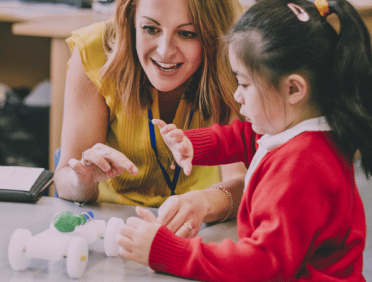A teacher is one of the most important people in a school setting. They are responsible for ensuring that children have access to the proper education and that they can have the best start in life.
Whilst this is true, it is also essential for those teachers to have the right support. Without support staff and teaching and learning assistants, teachers will find it very hard to offer the right level of attention to each child in the class.
With this in mind, let’s consider supporting school teaching and learning.
What is support teaching and learning in schools?
As we have already covered, the idea of supporting teaching and learning in schools will usually be a teaching assistant. Their role is to ensure that all the learning delivered to the children in the class can be accessed and that they are given the best chance to succeed in their education and get the best start in their school life.
This could be on a one-to-one basis if time and funding allow. Or, more often than not, group-based interventions that help children of a similar level to be able to achieve their end goals.
Who can become a supporting teaching and learning teacher?
Anyone who wants to work in a school setting and has a good level of numeracy and literacy can apply for a standard TA role. However, you must take the Level 3 Supporting Teaching and Learning course to be a supporting teaching and learning teacher.
Why is support important in learning?
Not every child will find school easy, and whilst many can do well in a class setting with just the support of a teacher, there are also lots of children, particularly those with additional needs, who will need extra support.
This support can help the child or children in question to be able to access the learning that they need properly. It can help them to understand what is expected of them within the school and to be able to progress towards their expected learning goals.
Without this support and with only a teacher, they might not be able to get that same level of focus, which means that they then do not succeed to as high a level as they may otherwise have been able to reach.
What is the role of learning support teacher?
The role of a learning support teacher is to offer a supportive role to the children within the class. They will work alongside the fully qualified teacher in the classroom to identify the children who will need additional support and how best to approach this.
They can then offer targeted interventions to ensure those children reach the level they can reach, rather than being left behind.
Other than that, this role is mainly like a normal teaching assistant role, and you will be expected to undertake everyday teaching assistant tasks as well as these additional responsibilities.
What are the learning support qualifications?
There are three levels to the supporting teaching and learning in schools qualification. The first level is level 2. This work-based qualification is targeted mainly at those who have not yet started to work within a school setting but are looking to do so in the future.
Once you have passed this course, you can take the Level 3 (although you can also take the Level 3 course without prior passing the level 2) course. This is aimed at those who are already working in the school setting but want to ensure that they have all the skills and knowledge needed to work as a TA to a high standard.
They can then, should they want to, move onto Level 4, which is usually called the Higher Level Teaching Assistant course, which gives them the knowledge to allow them to take on even more responsibilities within a school setting.
What is a Level 2 learning support practitioner?
If you have your level 2 in Learning Support, you will be ready to work in a school setting. You will have some of the skills required to support teachers and provide the children in the class with the very best learning possible.
What is a Level 3 Certificate in supporting teaching and learning?
A stage up from Level 2. The Level 3 Certificate in Supporting Teaching and Learning can help you to fully embed yourself into working within a school. It will help you learn techniques you can then use in the classroom and ensure that you understand regulations and legislation that applies to working within a school and that you need to follow.
What can I do with a teaching and learning qualification?
If you have achieved either the Level 2, 3 or HLTA qualification, then the good news is that this should make it even easier for you to apply for a job within a school. This is especially true if you are looking to step up and work as a higher-level TA.
What is a learner in a school handbook?
A learner in a school handbook will usually refer to the children or students who are within that school.
What are the best courses for support teaching and learning?
You can access the Level 2 and Level 3 course for Supporting Teaching and Learning in many different places. It is down to you to take the time to find out more about each one and assess whether it will be the right choice for you.
To download a .pdf of this blog, please click here












